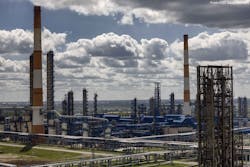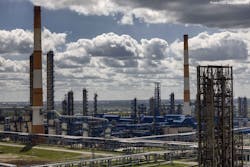Gazprom Neft advances water-treatment project at Omsk refinery
PJSC Gazprom Neft will build a closed-loop wastewater treatment plant at the 21.4 million-tonne/year Omsk refinery in Western Siberia as part of the company’s broader commitment under an ongoing modernization and upgrading program aimed at reducing environmental impacts as well as improving processing capacities, conversion rates, energy efficiency, and production qualities at its Russian refineries by 2020 (OGJ Online, Dec. 2, 2013).
Preparatory works are now under way for start of construction on the treatment project, which will include a multistage water-purification system composed of mechanical, physical, chemical, and biological treatments, as well as capabilities for carbon filtration and ultraviolet disinfection, Gazprom Neft said.
Alongside enabling a 17-fold reduction in total floor space allocated to treatment installations at Omsk, the combined technologies of the new multistage plant also will ensure 70% of treated wastewater is returned to the refinery’s production cycle, helping to reduce impacts on the local municipal wastewater treatment plant, the operator said.
Once completed, the wastewater system will increase the refinery’s overall production performance by about 20%, said Gazprom Neft and PJSC Omskneftekhimproekt (ONHP), the Russian engineering firm responsible for the plant’s design.
Gazprom Neft said it expects to invest about 17 billion rubles to complete the treatment plant, which is scheduled to be commissioned in 2019.
Additional projects
This latest project joins a series of works under way as part of the second phase of the Omsk refinery’s modernization program, which specifically aims to improve the overall yield of light-end refined products at the manufacturing site.
A major project now under construction includes a 2 million-tpy deep refining complex to increase the refinery’s output of Euro 5-quality diesel and jet fuels from heavy residues by more than 6%, as well as supply of up to 250,000 tpy of raw material for production of high-performance lubricants (OGJ Online, July 27, 2016).
Second-phase modernization plans also include the addition of a process condensate purification plant at the refinery, according to a Nov. 28, 2016, release from Gazprom Neft.
Planned for startup in 2018, the 100-cu m/hr plant will remove ammonia and sulfides from process condensate produced by the refinery’s secondary processing units, enabling 97% of the water to directly return to the processing cycle.
Sulfides and ammonia will be recycled into sulfur and nitrogen, both of which are in demand by petrochemical operators for use in their operations, Gazprom Neft said.
Designed by Technological Engineering Holding Peton of Russia, the new condensate purification plant—which will be equipped with the latest automation, diagnostic, and emergency response systems—is scheduled for startup in 2018.
Major projects already completed at Omsk as part of the refinery’s phased overhaul include:
• Reconstruction and modernization of the AT-9 crude distillation complex.
• Reconstruction of a sulfuric acid alkylation unit.
• Reconstruction of the fuel oil deep-processing complex, which enabled the refinery to increase 100% of its gasoline production to Euro 5-quality, high-octane gasoline.
• Construction of a catalytic-cracking and diesel hydrotreatment complex.
Contact Robert Brelsford at [email protected].

